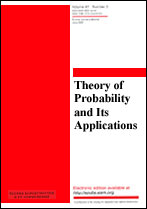|
|
Teoriya Veroyatnostei i ee Primeneniya, 1962, Volume 7, Issue 2, Pages 153–169
(Mi tvp4710)
|
 |
|
 |
This article is cited in 124 scientific papers (total in 124 papers)
Consistent Families of Measures and Their Extensions
N. N. Vorob'ev
Leningrad
Abstract:
Let $\Sigma$ be a family of Borel fields of subsets of a set $S$ and $\mu_{\mathfrak{S}}$ probabilistic measures on measurable spaces $\langle{\mathfrak{S},S}\rangle$, where $\mathfrak{S}\in\Sigma$. The family of measures $\mu_{\mathfrak{S}}$, $\mathfrak{S}\in\Sigma$, is denoted by $\mu_\Sigma$.
The measures $\mu_{\mathfrak{S}_1}$ and $\mu_{\mathfrak{S}_2}$ are said to be consistent if $\mu_{\mathfrak{S}_1}(A)=\mu_{\mathfrak{S}_2}(A)$ for any $A\in\mathfrak{S}_1\cap\mathfrak{S}_2$. If any pair of measures of the family $\mu_\Sigma $ is consistent, the family itself is referred to as consistent.
The consistent family $\mu_\Sigma$ is said to be extendable if there is a measure $\mu_{[\Sigma]}$ on the measurable space $\langle{[\Sigma ],S}\rangle$ consistent with each measure of $\mu_\Sigma$($[\Sigma]$ is the smallest Borel field containing all $\mathfrak{S}\in\Sigma$).
For the purposes of the theory of games the following special case of extendability is important. Let ${\mathfrak{K}}$ be a finite complete complex and $M$ the set of its vertices. Let a finite set $S_a$ correspond to each vertex a of ${\mathfrak{K}}$ and the set $S_A=\Pi _{\alpha\in A}S_\alpha$ to each subset $A\subset M$. Let
$$ \mathfrak{S}_K=\left\{{X_K:X_K=Y_K\times S_{M\setminus K},\,Y_K\subset S_K}\right\},\quad K\in{\mathfrak{K}};$$
$\mu _K$ is a measure on $\left\langle{\mathfrak{S}_K ,S_M}\right\rangle$ and $\mu _{\mathfrak{K}}$ is the family of all such measures. The extendability of the family $\mu _{\mathfrak{K}}$ is closely related with the combinatorial properties of the complex ${\mathfrak{K}}$.
Any maximal face of the complex ${\mathfrak{K}}$ is said to be an extreme face if it has proper vertices (i.e. such vertices which do not belong to any other maximal face of ${\mathfrak{K}}$). If $T$ is an extreme face of ${\mathfrak{K}}$ the complex ${\mathfrak{K}}^*$ obtained by removing from ${\mathfrak{K}}$ all proper vertices of $T$ with their stars is said to be a normal subcomplex of ${\mathfrak{K}}$. A complex ${\mathfrak{K}} $ is said to be regular if there is a sequence
$${\mathfrak{K}}={\mathfrak{K}}_0\supset {\mathfrak{K}}_1\supset \cdots\supset{\mathfrak{K}}_n$$
of subcomplexes of ${\mathfrak{K}}$ where ${\mathfrak{K}}_i$ is a normal subcomplex of ${\mathfrak{K}}_{i-1},i=1,\dots,n$, and the last member vanishes.
The main results of the paper consists in the following statement.
Theorem. The regularity of the complex ${\mathfrak{K}}$ is a necessary and sufficient condition of extendability of any consistent family of $\mu_{\mathfrak{K}}$ of measures.
Received: 17.12.1959
Citation:
N. N. Vorob'ev, “Consistent Families of Measures and Their Extensions”, Teor. Veroyatnost. i Primenen., 7:2 (1962), 153–169; Theory Probab. Appl., 7:2 (1962), 147–163
Linking options:
https://www.mathnet.ru/eng/tvp4710 https://www.mathnet.ru/eng/tvp/v7/i2/p153
|


| Statistics & downloads: |
| Abstract page: | 348 | | Full-text PDF : | 192 |
|




 Contact us:
Contact us: Terms of Use
Terms of Use
 Registration to the website
Registration to the website Logotypes
Logotypes








 Citation in format
Citation in format 
